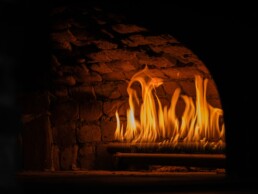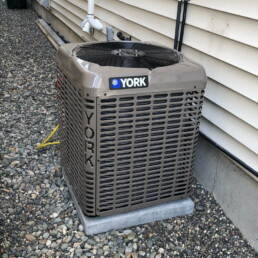Home Heating Breakdown: Which Option is Best for You?
If you live in a place like British Columbia that sees drastically different temperatures in the winter compared to the summer, you rely on your home heating system to keep you warm. There are various ways of heating your home as we’ll see, but the main idea for them all is transferring heat from one place throughout your home. You ask your home for heat, and it gives you heat.
As British Columbians are aware, home heating costs can soar during the winter. Some systems are more efficient or less costly than others to run, but they all cost money. It all depends on what type of fuel source you’re using and how that heat is being distributed throughout your home.
In this blog post, we’ll break down the five main fuel sources along with the five main distribution systems. We’ll discuss the benefits and drawbacks of each, the efficiency level, and the general cost to run. By the end, you’ll have more complete knowledge of how home heating works, and you’ll be aware of all your options.
If it’s time to upgrade your home heating system, get in touch with Hudson Service Group, the plumbing and HVAC experts. Plus, they’ll quote your job for free. Give them a call today at 604-826-7989.
The Five Heat Sources
Furnace
Furnaces are the most popular home heating source in new homes being built today. They can be powered by either gas, oil, propane or electricity. It works by heating up air and using a blower fan to distribute the warm air throughout your home.
One key benefit that separates furnaces from boilers is that they can be used to both heat your home in the winter and cool your home in the summer when attached to a forced air distribution system. One drawback is the blower fan noise, which can be quite loud in some cases.
Cost: Inexpensive
Efficiency: 59 – 98.5%, depending on age
Boiler
Most older homes today use a boiler system. Similar to a furnace, the boiler is a central home heating unit, except it heats water or steam instead of air. The water or steam is boiled before being sent through pipes to heat the home. To power a boiler, you can use natural gas, propane, fuel oil, biodiesel blends or electricity.
A boiler system can’t be used to cool air like a furnace, but it can provide better-zoned heating. So you have the power to heat just a couple of rooms if you prefer. As a drawback, these systems are expensive to install, and also require a minimum year-round temperature to prevent the pipes from freezing.
Cost: Expensive installation
Efficiency: 50 – 90%, depending on age
Heat Pumps
Heat pumps are the newest home heating technology, and work well for both heating your home and cooling it. Similar to an air conditioning unit, a heat pump extracts air from the outside. It then transfers the air to indoor air handlers throughout your home. They can be fueled by either electricity or geothermal energy. Heat pumps also have a lifespan of about 15 years – shorter than a typical boiler or furnace.
While these units are slightly more efficient, they don’t work great in ultra-cold climates. But people love heat pumps because there’s no ductwork required, and the heat can be controlled in each room (or wherever you have a wall unit installed).
Cost: Expensive installation, depending on the number of air handler units
Efficiency: 7.7 – 10 HSPF (8.2+ are awarded the ENERGY STAR® label by the US EPA)
Solar
Active solar heating relies on the hot shining orb in the sky to heat either a liquid or air in some type of storage system. From there, it can be either stored or used to provide instant heat via radiant floor, hot water baseboards, or a forced air system.
This modern home heating technology is best for the environment, and the fuel source is free! Active solar heating can help you save lots on your home heating, but unfortunately, in most climates, you’ll need a supplementary heat source to back it up.
Cost: Least expensive (although it will likely rely on another system for help)
Efficiency: N/A
Electric Heating
The fifth and final heat source option is electric heating, or electric resistance heating, often in the form of portable and space heaters. They convert electricity directly into heat.
These systems are inexpensive upfront and are incredibly efficient. The problem is, compared to combustion systems, they’re quite expensive to run long-term. But if you live in a hot climate, a space heater could be all you need. They heat up instantly and are great for warming specific spaces.
Cost: Inexpensive upfront
Efficiency: High (95%+)
The Five Distribution Systems
Forced Air
As the most popular residential heat distribution system today, a forced air system transfers hot or cold air from a furnace and shares it throughout the home using a collection of ducts and vents. This system can be powered by electricity, propane, gas or oil, and can even be retrofitted to increase efficiency. The one downside of forced air is that it distributes all air – allergens included. So be sure to change your filters frequently in order to avoid circulating dirty air.
Steam Radiant
Steam radiant heat distribution has been around for a long time, and is still used in many older homes. These systems use a handful of radiators placed around the home to transfer the steam into heat. They’re compatible with boilers, and can’t double as cooling systems in the summer. But generally, this is a clean, safe way to heat your home.
Radiant Heating
Radiant heating distribution can be installed on either your floor, ceiling, or wall panels. This type of system is compatible with boilers, solar, and electric heating, and works by moving heat from a hot surface to people or furniture. The downside is that installing and repairing the system can run up a large bill.
Hot Water Baseboards
Baseboards are attached to the wall near the floor and can be placed strategically throughout the home. Also known as hydronic heat, these systems heat water to warm your space. The main benefit of a baseboard heater is the ability to maintain close control over how warm each room it. But be careful – you can’t leave any furniture, plants, beds, or anything else resting against the heaters.
Electric Baseboards
Electric baseboards are similar to hot water baseboards, as they provide heat to different zones and are attached to walls. But instead of using heated water or steam, they use heated air. They also have the ability to pull cold air into the bottom of the unit, all while forcing warm air out the top. Be sure to clean the coils regularly to improve efficiency and prolong the system’s life.
If you’re looking for a home heating upgrade, call the qualified professionals at HSG. We work with furnaces, boilers, heat pumps, hot water heaters and air conditioning, and we’ll quote your job for free. Get in touch today by filling out our contact form or giving us a call at 604-826-7989.
Why You Should Invest in a High Efficiency Furnace
Installing a high efficiency furnace is becoming a home improvement priority for more and more Canadians. Some are looking for cost savings, while others wish for cleaner air and steadier temperatures. As you’ll see, there are a number of strong arguments for paying the higher upfront cost in exchange for something more efficient and cost effective in the long run.
So what’s all the fuss about?
If you’re looking at installing a high efficiency furnace in your home, there’s a good chance you’ll be looking at what’s also known as a ‘condensing furnace’. A condensing furnace works almost like a typical fuel based forced-air furnace. The difference maker is the addition of a second heat exchanger.
It all starts with the thermostat, which determines the temperature and fires the furnace. The burners then create the heat that is blown throughout the home with the help of strong fans and ductwork. The second heat exchanger will then extract any extra heat from the exhaust (which would normally head outside). This is what makes condensing furnaces so efficient.
In this blog post, we’ll break down the key reasons why you should consider installing a high efficiency furnace in your home:
Save $$ on Energy Bills

Upgrading your home heating to a high efficiency gas furnace is one of the most cost effective options. According to FortisBC, Lower Mainland residents will pay an average of $920 per year to heat their home with a natural gas furnace. Compare that with $1,095 per year with an electric heat pump, $2,195 per year with electric baseboards, and $2,505 per year with electric baseboards. What a difference!
If the average Canadian switches to a high efficiency gas furnace, they’re bound to use far less electricity, there for saving money on their electricity bills. But how much depends on the province. In a hypothetical scenario where a BC resident cuts their electricity use in half, they can actually save about 54% on their electricity bill. On the other hand, an Alberta resident who makes the same electricity consumption cuts will only save roughly 41% on their electricity bill.
Help Out the Environment

If conserving energy, keeping pollutants out of the air and protecting our environment are important to you, replacing your furnace with a high efficiency model should be a no-brainer. High efficiency furnaces have a smaller carbon footprint than older models for two reasons. They use less fuel, and they’re able to reclaim heat that would otherwise be discarded. And the difference isn’t negligible, either.
According to the US Department of Energy, low efficiency furnaces have an annual fuel utilization efficiency (AFUE) between 56% – 70%. That means the remaining energy is wasted and blown out of your home as exhaust. But with a high efficiency furnace, it’s a totally different game. High efficiency models sit somewhere between 90% and 98.5% AFUE, meaning hardly anything is wasted.
More Comfort

Another big reason to switch to a new high efficiency furnace is the supreme comfort level. Your home will become more comfortable, and your family will feel that difference in more ways than one.
First, there’s the temperature level. With a high efficiency furnace, you’ll have much more control over how much heat is dispensed, and that heat will be delivered at a more consistent level. Because it is more efficient, the system won’t need to crank itself up to full blast to deliver heat.
High efficiency furnaces are also bound to make less of a racket. Thanks to sound absorbing materials and other innovations, these systems are incredibly quiet. These high efficiency furnaces don’t need to work as hard to heat your home, as they’re able to operate at a much lower speed.
Finally, you’ll notice the air quality is night and day with a high efficiency furnace. Thanks to better filtration technology, these new furnaces are able to remove dirt, dust, mold, and other undesirable debris from your air. If you’re prone to airborne allergies, you’re bound to notice a difference in the air quality.
Rebates are Available!

If you aren’t already convinced on a new high efficiency furnace, maybe our final reason will tip you over the edge. If you choose to upgrade your gas furnace, FortisBC will offer you a hefty rebate. By replacing your old furnace with an eligible ENERGY STAR® model, you could qualify for up to $1,000 back on the purchase price. Plus, if you install an eligible connected thermostat you’ll qualify for an extra $150 back.
The upfront cost of upgrading to a high efficiency furnace is often the biggest obstacle for everyday British Columbians. Even though the savings are there month to month, the upfront cost can be difficult to reckon with. But with FortisBC’s rebate of up to $1,000, your upfront cost becomes much easier to swallow.
If you’re ready to upgrade your furnace to a new high efficiency model, be sure to contact the furnace installation pros at Hudson Service Group. We’ve been repairing and replacing heating and cooling systems in the Fraser Valley community since 1999. Contact us today for a free quote on your new furnace.
4 Signs You Should Replace Your AC Unit
Four Signs You Should Replace Your AC Unit
Your air conditioning unit has the all-important job of keeping you and your loved ones comfortable indoors all year round. Proper AC is a big investment, but a worthwhile one. If you’re living in the Lower Mainland, you’ll remember the heat wave of 2021. Your AC works hard for you.

With record temperatures in the books from last summer, that AC investment is looking even more precious. In order to avoid disaster, as we approach a new summer, it may be a good idea to proactively evaluate your AC unit for repair or replacement.
Take it from us: The middle of summer is not the time you want to be replacing your AC. Being the busiest time of year for AC repair and replacement, you’ll be forced make a quick purchase decision and will likely have to go days without AC in the meantime.
To help you eliminate the guesswork, here are 4 warning signs that it’s probably time to replace your hardworking AC unit:
1. Your AC is more than 10 years old
Old age doesn’t always mean the end of life is imminent. If properly installed and maintained, it’s reasonable to expect you’re AC to last 10-15 years. Newer units can even last up to 20 years. But if you’ve left your AC hanging for the past decade, it’s probably near time for a replacement.
One of the big differences between your AC and the rest of your appliances is that it normally lives outside. All year round it’s battling the elements – rain, snow, and extreme temperatures along with falling debris that can often cause incremental damage.
You’ll have to weigh the pros of cons of replacing versus repairing, but if your unit is more than 10 years old, keep in mind its parts are also old. If parts have become obsolete, it may be tough or even impossible to find replacement parts.
If you’d like to talk to one of our qualified AC technicians about your options, we’d be happy to connect, answer any questions and get you a free quote.
2. Your Energy Bills are Skyrocketing

AC works hard, especially in the hottest months. That means it will eat a significant portion of your energy bill, and you can expect seasonal fluctuations – that’s totally normal.
But if you notice your bills spiking unusually, despite no major lifestyle changes, that could be sign of an inefficient AC system. And an inefficient system is one that isn’t working properly.
If your energy bills are running high and don’t return back to a normal level, that’s a good sign that your AC is due for a replacement. If you’re unsure about the culprit of your higher energy bill, you can always order a home energy audit to pinpoint the problem.
Our AC experts at Hudson Service Group would be happy to come inspect your system and offer a quote, free of charge.
3. Your Home Doesn’t Feel Cool
There are a number of reasons why your AC unit isn’t blowing cool air. Either way, this will surely be a frustrating experience, especially during the summer months. In some cases, the AC system may just need some love, while in others it could mean major malfunction and replacement is long overdue.
In less serious instances, your unit by be clogged with dust or debris. You can wipe down the AC filters and ducts by hand, or call to get your filter replaced altogether. As a general best practice, these filters should be replaced roughly every 3 months, depending on the system.
If your system isn’t blowing cool air, or your home feels damp and humid, it could also mean your AC’s life is almost over. An inefficient system will have trouble removing moisture from warm air and turning it into cool air. If this is happening to your unit, it’s time for a replacement.
Give us a call and one of our technicians would be happy to come take a look at your AC.
4. Your AC is Constantly in Need of Repair
 It’s completely normal to have yearly AC maintenance done for your system. But if it continues to break down and have problems, that’s not a good sign. If leaks, weird smells, and weird sounds are constantly bugging you, it may be time for an AC replacement.
It’s completely normal to have yearly AC maintenance done for your system. But if it continues to break down and have problems, that’s not a good sign. If leaks, weird smells, and weird sounds are constantly bugging you, it may be time for an AC replacement.
AC repairs can be costly, and if you’re constantly picking up the phone for service, it might make more sense to replace your system altogether. In the long-run, you’ll likely save money and headaches.
If you’re unsure about whether it’s time for an AC repair or replacement, reach out to Hudson Service Group and we’d be happy to offer a free AC consultation.
If your AC is functioning well, or you just aren’t able to replace your current system right now, there are a few things you can do to prolong its life:
- Regularly check for debris and dust. You can save your system a lot of stress by helping it out with a cloth once and a while.
- Find your ‘magic number’ and leave the temperature the same 24/7. Set and forget cooling uses less electricity, costs less, and will be less taxing on your AC system.
- Remember to change your filter every 3 months at a minimum – if it’s plugged, your system will shut down.
- Have your system serviced at the turn of the season (hot into cold, and cold into hot).
- Use ceiling fans and sun blocking blinds. This will help take some of the load off your AC unit.
To schedule regular maintenance or a free consultation for an AC replacement, get in contact with our AC experts at Hudson Service Group:





